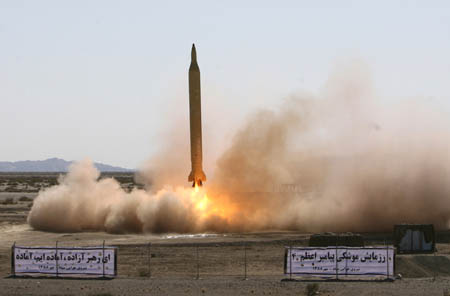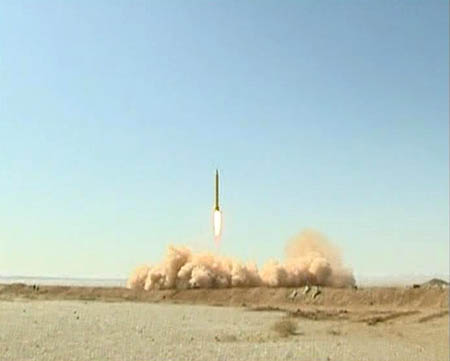Iran successfully test-fires multiple-range missiles
The Islamic Revolution Guards Corps (IRGC) successfully test-fired on Monday its home-made multiple-range missiles ahead of a meeting with five permanent UN Security Council member nations plus Germany next week.
 |
|
A Ghadr 1 class Shahab 3 long range missile rises into the air during a test from an unknown location in central Iran Sept. 28, 2009. [Xinhua/Reuters Photo] |
The local English language satellite Press TV reported that the test-fired Sejil has a range of 2,000 kilometers and that of Shahab-3 is between 1,300 and 2,000 kilometers.
It is the first time that IRGC used a two-stage (Sejil) missile with solid fuel in war games, the semi-official Fars News Agency said.
IRGC also test-fired several other missiles on the second day of the war game dubbed The Great Prophet IV which started on Sunday, including Shahab-1 and Shahab-2.
According to the reports, the medium-range Shahab-1 and Shahab- 2, with ranges between 300 and 700 kilometers, were also successfully launched overnight.
Iran's official IRNA News Agency quoted the Foreign Ministry spokesman as saying that the test-fires were not related to the country's nuclear program.
Hassan Qashqavi said "it has nothing to do with the national nuclear program."
The maneuver is a sequel to the Great Prophet III carried out last year by the IRGC naval and ground forces in the Persian Gulf and Strait of Hormuz region.
IRGC Air Force Commander Brigadier General Hossein Salami said earlier that the war game was aimed at improving the Islamic Republic's defense capabilities.
 |
|
A frame grab taken from video footage released on Sept. 28, 2009, shows a missile being fired in Iran. [Xinhua/Reuters Photo] |
"We will give a fully decisive, crushing and destructive response to anyone who poses a threat to the existence, independence and freedom of the ruling system and our values," Salami was quoted as saying by IRNA.
Amid the concerns raised by some Arab neighboring states of Iran over its missile test-fires, Salami said that Iran's missile system was by no means a threat to the neighboring states.
The United States and other Western powers are skeptical about Iran's weaponry program, especially those of missiles which could possibly use nuclear materials.But Tehran contends that its military and nuclear program were of defensive and peaceful component.
The five permanent UN Security Council member nations and Germany are set to meet with Iran next week in Geneva to discuss Tehran's uranium enrichment program.
 0
0 






